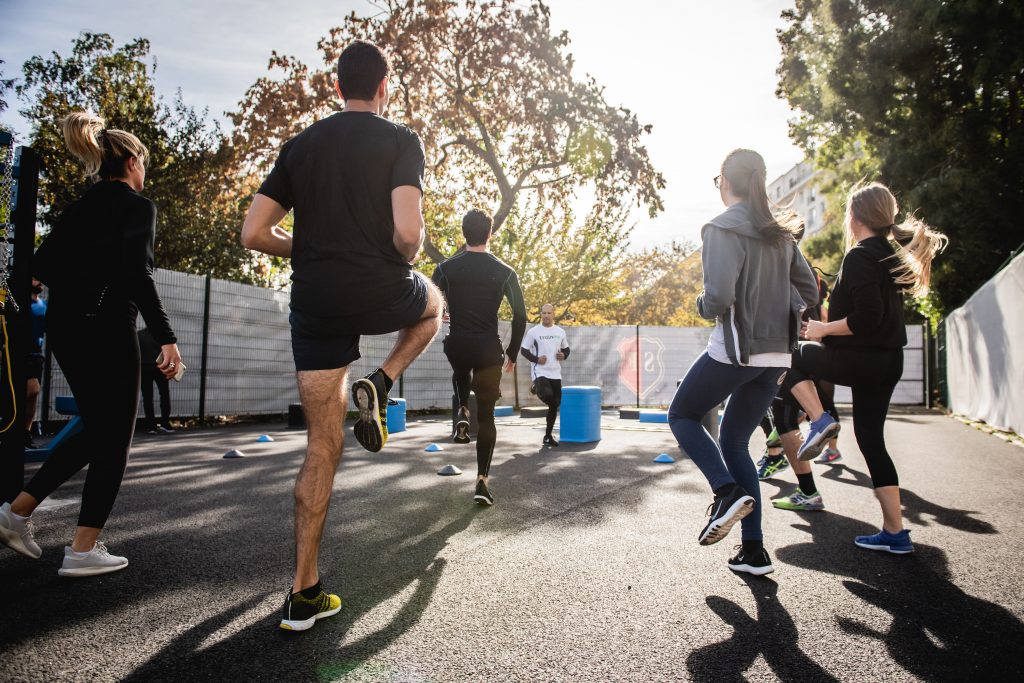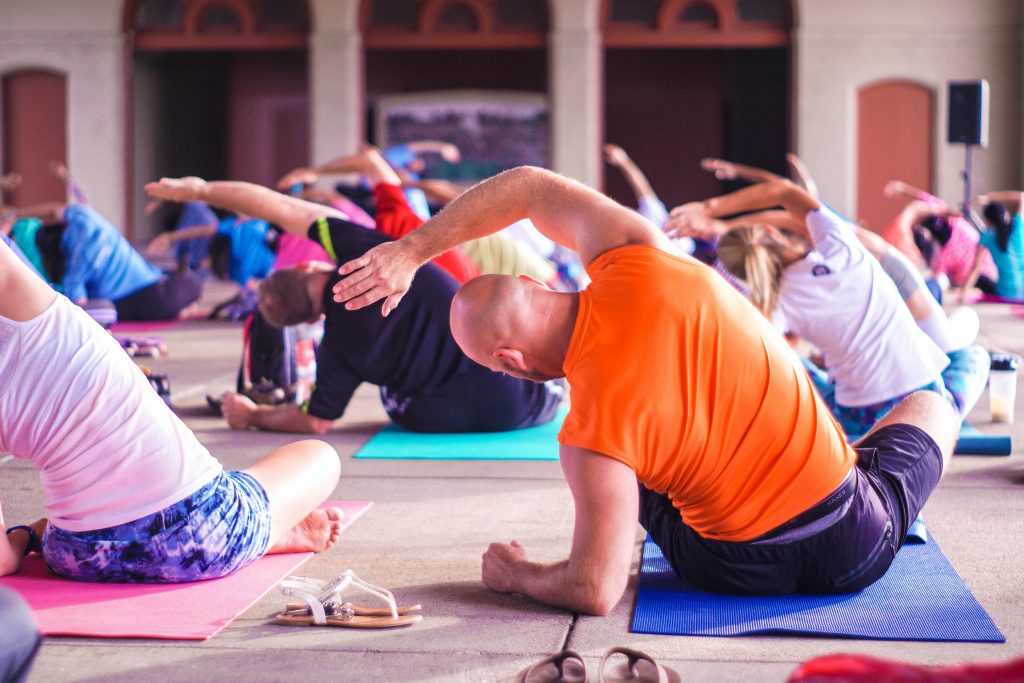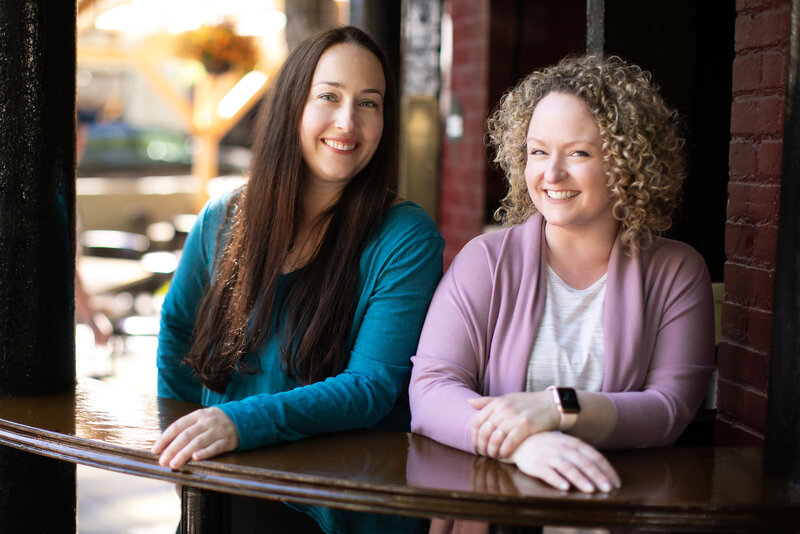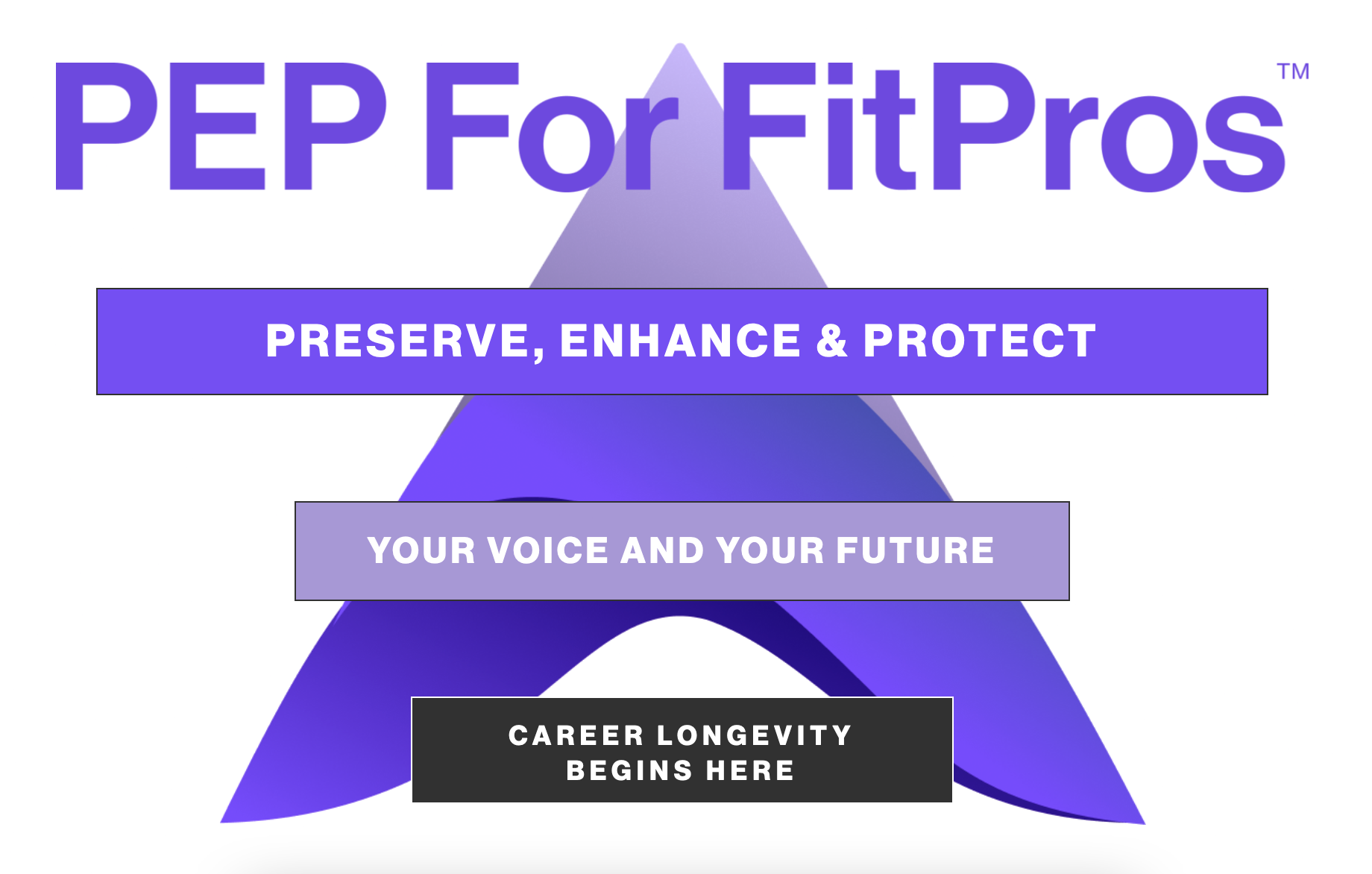What is PEP for FitPros and what does it represent?
PEP for FitPros is a collaboration between Noël Nocciolo & Ashley FitzSimmons-Olsen, MS CCC-SLP.
PEP is our voice course which provides simple, actionable tools for all-format group exercise instructors and personal trainers. We created it for those who want to both fill their room and keep members engaged, as well as continue coaching for many years to come.
“PEP” = Preserve, Enhance, Protect.
“Preserve & Protect” is voice care, health and hygiene. We teach simple strategies anyone can do to avoid voice issues which can lead to loss of income when subbing-out sessions due to temporary voice loss, at best, and voice changes and/or the need for delicate surgery with a long rehabilitation process, at worst.
“Enhance” is voice performance. We leverage our backgrounds as two former performers both with university undergrad degrees in acting with 5 simple tools we learned in school, as it applies to inspiring members to do hard things in an exercise session.
What was the gap you identified and how does PEP fulfill this? What makes it stand out?
A growing body of research shows us that voice problems and vocal injuries are more prevalent in exercise professionals than the general population. Across studies, anywhere from 55-79% of exercise professionals report symptoms or diagnoses of voice problems, as opposed to 30% of the general population. This is a clear and significant discrepancy that needs to be addressed in order to help exercise professionals enjoy long, healthy careers. Our PEP course provides continuing education for exercise professionals to provide them with tools to preserve, enhance and protect their voices, as well as vocal performance tips to draw members in and keep them coming back.
We also bring our unique backgrounds, experiences and education to PEP. Noël holds an undergraduate degree in acting and has worked in 14 countries, including 8 in the Asia Pacific region, teaching hundreds of exercise professionals how to teach indoor cycling classes, as well as teaching upwards of a thousand indoor cycling classes herself beginning in NYC in 2011. Ashley is a practicing speech-language pathologist with a Master’s degree in Speech-Language Pathology, and she holds national certification from the American-Speech-Language-Hearing Association (ASHA). Additionally, Ashley holds an undergraduate degree in acting and has taught a variety of dance, voice, and musical theatre classes. We also care deeply about exercise professionals having the tools to fill their rooms, keep members coming back and continue teaching for as long as they’d like without voice injury or strain. All of this expertise makes PEP stand out in the field.

What is PEP’s contribution to the industry at large, and how does it do it?
Our contribution to the fitness industry is to provide simple education on how to be a more compelling public speaker when leading people, as well as what to do daily to preserve your voice; your most underutilized instrument. Our course includes the anatomy & physiology of the systems of our voice, just as one would expect in fitness format certifications, as well as the opportunity for group and 1:1 work to improve one’s voice delivery. We know that there are many group exercise formats and there will always be new group exercise formats to become qualified to teach, and our voice care and vocal delivery tools will complement all of them.
How has technology impacted the fitness landscape in the last few years, and how does PEP make use of it?
It’s now not uncommon for an exercise professional to supplement (or replace) joining an in-person workshop or certification with online trainings, and we have embraced the improved accessibility that online trainings can offer. Once we could travel again following pandemic quarantines, we had our comprehensive voice performance and voice care course professionally filmed, edited and broken down into easily digestible video modules. PEP is hosted online where it can be accessed 24/7 by exercise professionals who have enrolled; irrespective of one’s timezone or personal schedule.
We do believe, however, that in-person workshops, learning at live conference sessions and immediate feedback are important. Our PEP – Premium course integrates 3 Zoom calls and 1 month of group messaging so that exercise professionals have as much support from us, virtually, as possible! We also conduct in-person workshops, as well as a combination of one of us in-person with a group of exercise professionals and one of us joining via Zoom. We feel that this flexibility in blending in-person and virtual training has been successful in helping studios across the globe bring this critical training to their teams.
What are your TOP tips to emerging exercise professionals looking at elevating their careers?
1. Consider the source of information found online and that TikTok and Instagram are tools, but not everything. Just because someone has thousands or millions of followers on social media does not necessarily mean they are qualified to lead other people or provide accurate information. Are they certified and teaching the best-use principles from their certification? Or are they showing exercises which look really cool on social media, but in actuality go against basic exercise science and are, thus, slowly (or not so slowly) hurting others?
2. Do not forget that the HOW is as important as the WHAT when you are delivering your sessions! Your voice and how you deliver information can be the element that makes all the difference for your clients. It is your most underutilized tool!
3. Drink enough water throughout the day. Hydration is so key for a well-functioning person, regardless of job, but it is especially true for exercise professionals who are taxing their voices and their bodies at the same time.
4. Speak at a normal volume into your microphone when teaching group classes. Do this every time.
5. Remember that the fitness industry is, unfortunately, unregulated. It is up to all of us to continue to educate ourselves as our careers progress and learn from others with knowledge and experience. There are more regulations around opening a coffee shop with friends than opening a boutique fitness studio, and that is wild, but true!

What do you see in the future of fitness in the next 12-18 months?
1. Online continuing education for coaches and a happy audience of members wanting online exercise sessions are here to stay. We live in a hybrid world. A chunk of the fitness market never plan to go to a gym again when they can work out at home. On the flip side, others never want to be at home working out when they can feed off the positive energy of in-person fitness. There is also an overlap of segments wanting a little of both options to suit their needs. We believe that there is enough to go around!
2. The number of coaches attending USA fitness conferences which include trainer education have not even come close to bouncing back post-covid. This is an opportunity (or a caution/something to consider for markets outside the USA) to really look at WHO the presenters are and WHAT kind of innovative session topics they’re sharing. What will happen to these large-scale fitness events in the next 5 to 15 years as generations of educators continue to retire if there aren’t compelling, well-qualified “newer” presenters taking the mic?
What are some of the biggest challenges for you and your team had to overcome?
1. PEP’s mission is to prevent problems before they start. Myth-busting has been challenging for us with potentially harmful misinformation being shared by those without the expertise to do so. While it’s sadly COMMON that group exercise professionals often experience temporary voice loss, raspiness, hoarseness, and voice changes, these examples are NOT normal or healthy. All of these challenges can be prevented using the appropriate tools.
2. Educating exercise pros to see the opportunity in using their voice healthily to coach members in a clear and entertaining way because very few are talking about healthy voice use in the fitness industry. Exercise professionals are professional voice users, or people whose livelihood depends on their ability to use their voice. We believe that the voice is our most underutilized tool as coaches; how we speak, how we inspire, how we convey crucial information about exercises… all of this uses our voice. If we cannot speak, or if we speak and are not compelling… how are we going to serve others?
3. Reminding group exercise instructors that the microphone has one purpose: To make us sound louder. That’s it! Microphones amplify our voices only, they do not make us sound more clear. Only louder. One purpose.
We absolutely should not be shouting into a microphone for 3 good reasons:
a) Shouting is phonotraumatic and can cause voice damage to the person shouting
b) Being shouted at can be stressful and exhausting for members who are joining a session to feel empowered and grow stronger
c) Shouting into a mic can distort the sound quality, which is counterproductive to an instructor’s goals of being heard. Shouting into the mic actually does the opposite of what we want it to do!

What is PEP’s underlying motto, and how’s this inspiring you and the fitness community at large?
Our mission is in our name: Preserve, Enhance, Protect. We are passionate about providing exercise professionals with the knowledge and tools to take charge of their own vocal health and vocal performance techniques and help them grow as engaging leaders. We love watching exercise professionals learn these techniques and make “light-bulb” moment connections that they can start implementing right away in their next class; these are the moments that inspire us. We hope that the information we provide will lead to a generation of overall healthier, stronger leaders in the profession.


